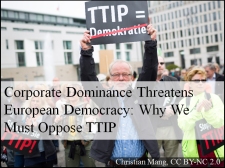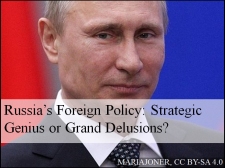Commentary by Louis VIS
‘A day will come when we shall see those two immense groups, the United States of America and the United States of Europe, stretching out their hands across the sea, exchanging their products, their arts, their works of genius’ (Victor Hugo at the International Peace Congress in Paris, 1849).
Although the European Union (EU) and the United States of America (USA) only started to negotiate a ‘Transatlantic Trade and Investment and Partnership’ (TTIP) in 2013, it seems that as early as the nineteenth century, visionaries such as Victor Hugo had already understood the necessity and importance of a transatlantic partnership. Currently, most international trade agreements are done via the World Trade Organisation (WTO). In 2001 the WTO launched a new round of talks in Doha to boost global trade. However, these negotiations stalled and eventually collapsed in 2008. Consequently, this has forced many countries to seek alternatives in order to increase economic growth. The best example would be the recent signing the Trans-Pacific Partnership (TPP) between the USA and 11 other countries on the Pacific Rim. If deals at a global level cannot be agreed why should we prevent countries from seeking alternate agreements? Furthermore, from a European perspective, it is vital that we do not let deals such as TPP leave us behind. Negotiating deals such as TTIP and CETA (between the EU and Canada) are two ways for the EU to ensure it remains one of the world’s leading economic powers. However, as with any deal challenging the status quo, anti-TTIP protests have grown louder across Europe and the US. Unfortunately, these critics often fail to acknowledge the numerous benefits a transatlantic partnership would bring (see Part II).

TTIP aims to liberalise trade and create a free trade area between both sides of the Atlantic. This would have a huge global impact. Indeed, when put together the USA and the EU represent 60% of global GDP, 42% of world trade in services and 33% world trade in goods. Why should we stand in the way of a deal connecting two economic superpowers? The more we help facilitate trade between the two, the more we will gain from it. Whilst some critics are right in arguing that both trade blocs account for a declining share of global economic output, they ignore that this is one of the very reasons why a transatlantic deal would be beneficial. Indeed, although ‘there is certainly money to be made in new markets […] old markets [are] still where the majority of our profits are generated’. The Centre for Economic Policy Research argues that with tariffs and trade barriers already low between both trade blocs the main part of the deal will seek to reduce conflicts of duplication between the USA and the EU (for example, food safety, environmental standards, manufacturing parts). Ultimately this would allow both parties to draw common standards thereby increasing efficiency and economies of scale for many businesses whilst also allowing the EU and the USA to set the ‘rules of the road’ and thus remain standards makers rather than standard takers. Indeed, the USA and the EU are each other’s biggest investment partners and are the largest trading partners for many of the world other powers. The signing of TTIP would therefore force third parties to adopt the common standards (from trade to human rights) set by the new deal rather than the other way round. In the words of Sigmar Gabriel, Vice-Chancellor of Germany: ‘If the negotiations fail, we will have to adapt ourselves to other standards, maybe those that will one day be agreed upon between China and the US’.
Furthermore, at a time of global insecurity, the signing of TTIP would help to cement transatlantic relations by creating an ‘economic NATO’, which would benefit both sides of the Atlantic. Studies by the European Commission also suggest that the deal could boost transatlantic trade by 50%, thus increasing living standards and average incomes on both sides of the ocean. With economic growth at record lows across Europe and inflation stagnating around 0% there is no doubt that TTIP would bring much needed stimulus to many industries and national economies, whilst also making the European market more competitive through innovation in key industries. Not to mention the millions of new jobs which will be created locally. All-in-all it is predicted that TTIP could boost the US economy by €90 billion, the EU’s economy by €120 billion and the rest of the world by €100 billion. Should the 3 million European citizens currently opposing TTIP really prevent the other 500+ million from enjoying such benefits?

Let us not forget that whilst politicians and the media are quick to blame the EU for TTIP, leaders of all 28 European Member States gave the European Commission the mandate to negotiate the deal with the USA on their behalf. Because the EU is first and foremost a trade bloc, the European Commission therefore has a high level of expertise and power in trade negotiation. As a result there is little doubt that negotiating the deal through the EU will give us all extra global clout and provides us with the strongest chance to secure the best possible deal with the USA. Furthermore it is also in the EU’s own interest to negotiate the most positive outcome for its citizens, although the deal will require compromises from both sides.
Although people have every reason to be worried by such an overwhelming deal, we should remember that our economies are still stagnating and TTIP would provide a much-needed stimulus. Not to mention that, depending of his successor, if TTIP is not agreed before President Obama leaves the White House in January 2017 we might find ourselves in a much less favourable position for negotiations. All in all, Europe is at a crossroad. We can either choose to take the lead by making sure the EU remains a global economic power that can be taken seriously or we can choose to get left behind in which case people should be prepared to face the consequences.
RELATED ARTICLES:






What about the claims that conforming to American requirements will lower standards in Europe? E.g. I have read that American corporations will be able to sue European governments who have a minimum wags, as it affects their profits. Likewise for toy safely and food quality standards, etc.
LikeLike
Hi,
If you are interested in reading more about this particular issue or concern I suggest you have a look at the second article I wrote for our TTIP ‘Special Issue’: https://youngeuropeansnetwork.wordpress.com/2015/11/11/ttip-an-answer-to-critics/ . Hope that answers your question and that you enjoy the other articles we publish on the blog.
Regards,
Louis
LikeLike